

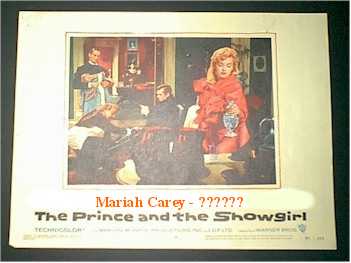 |
At this moment November the 8th. 2003, we don't know yet what will be the exact title of the play, if it will be more theatrical or more musical, on which version the play will be based or if it's officially confirmed, even if Mariah talked about it to a fan at the Milan Meet and Greet. But I already decided to give you all the infos about the play, the movie and the musical which have been made. All the infos that you will find here were taken from multiple sources on the internet and in libraries. So, please, if you want to use something from this page, don't forget to credit Heroes of Mariah for the research and the Mariah lobby card, thanks. |
The writer
Terence Rattigan - born on June the 10th.
1911 - Rattigan attended Harrow, Trinity College at Oxford was his next
stop. There, Rattigan moved into a theatre crowd to develop his growing
talent. His first play was written while at Trinity and was produced in
1934. Fittingly titled "First Episode," his introduction to the theatre
community moved quickly from Surrey to London's fashionable West End Theatre
District. Rattigan enjoyed uninterrupted success from 1936 until 1956.
Terence Rattigan died on Wednesday, November 30th, 1977.
His work:
Plays:
"First Episode" (1934), written with Philip
Heimann
"A Tale of Two Cities" (1935, first performed
in 1950), written with John Gielgud
"Grey Farm" (1935, first performed in 1940),
written with Hector Bolitho
"French Without Tears" (1936)
"After the Dance" (1939)
"Follow My Leader" (1938, banned by Lord Chamberlain
until 1940)
"Flare Path" (1942)
"While the Sun Shines" (1943)
"Love In Idleness" (aka "O Mistress Mine,"
1944)
"The Winslow Boy" (1946)
"Playbill" (1948), including "The Browning
Version" and "Harlequinade"
"Adventure Story" (1949)
"Who Is Sylvia?" (1950)
"The Deep Blue Sea" (1952)
"The Sleeping Prince" (1953)
"Separate Tables" (1954), including "Table
by the Window" and "Table Number Seven"
"Variation on a Theme" (1958)
"Ross" (1960)
"Joie de Vivre" (1960)
"Man and a Boy" (1963)
"A Bequest to the Nation" (1970)
"In Praise of Love" (1973), including "Before
Dawn," "After Lydia," and "In Praise of Love"
"Duologue" (1976), adapted from television
play "All on Her Own"
"Cause Célèbre" (1977)
Screenplays:
"French Without Tears" (1939, dir. Anthony
Asquith)
"Quiet Wedding" (1940, dir. Anthony Asquith),
written with Anatole de Grunwald
"The Avengers" (1942, dir. Harold French),
written with Anatole de Grunwald and Patrick Kirwan
"Uncensored" (1942, dir. Anthony Asquith)
written with Wolfgang Wilhelm and Rodney Ackland
"Her Man Gilbey" (1944, aka "English Without
Tears," dir. Anthony Asquith), written with Anatole de Grunwald
"Journey Together" (1945, dir. John Boulting)
"Johnny in the Clouds""(1945, aka "The Way
to the Stars," dir. Anthony Asquith), written with Anatole de Grunwald
"Brighton Rock" (1947, dir. John Boulting),
written with Graham Greene
"While the Sun Shines" (1947, dir. Anthony
Asquith), with Anatole de Grunwald
"Bond Street" (1948, dir. Gordon Parry), written
with Anatole de Grunwald and Rodney Ackland
"The Winslow Boy" (1948, dir. Anthony Asquith),
written with Anatole de Grunwald
"The Browning Version" (1951, dir. Anthony
Asquith), 1951 Cannes Film Festival Award for Best Screenplay
"Breaking the Sound Barrier" (1952, aka "The
Sound Barrier" dir. David Lean), 1953 Academy Award nomination for Best
Story and Screenplay
"The Final Test" (1953, dir. Anthony Asquith)
"The Man Who Loved Redheads" (1955, dir. Harold
French)
"The Deep Blue Sea" (1955, dir. Anatole Litvak)
"The Prince and the Showgirl" (1957, dir.
Laurence Olivier)
"Separate Tables" (1958, dir. Delbert Mann),
written with John Gay 1959 Academy Award nomination for Best Screenplay
based on Material from Another Medium
"The VIPs" (1963, dir. Anthony Asquith)
"The Yellow Rolls Royce" (1965, dir. Anthony
Asquith)
"Goodbye Mr. Chips" (1969, dir. Herbert Ross)
"Bequest to the Nation" (1973, James Cellan
Jones)
Original Television Scripts:
"The Final Test" (1951, dir. Royston Morley)
"Heart to Heart" (1962, dir. Alvin Rakoff)
"Ninety Years On" (1964, dir. Michael Mills)
"Nelson--A Portrait in Miniature" (1966, dir.
Stuart Burge)
"All on Her Own" (1968, dir. Hal Burton)
"High Summer" (1972, dir. Peter Duguid), adapted
from earlier, unperformed stage play
"Nijinsky" (unproduced)
Radio:
"A Tale of Two Cities" with John Gielgud,
from the novel by Dickens (1950)
"Cause Célèbre" (1975, prod.
Norman Wright)
The play
The Sleeping Prince - Great Britain - October
1954 - Written by Terence Rattigan (in 1953) - Directed by Geoffrey Wardwell
- Performed at Preston Repertory Company, Royal Hippodrome Preston from
1954
to 1955 and at the Coronet Theatre, NY, USA from November the 1st. 1956
to December the 22nd. 1956 - Lyrics and music for "The Coconut Girl"
by Vivian Ellis.
Story:
The Grand Duke Charles, on the eve of his
coronation, decides to spend it with a chorus girl. She feels sorry for
the loneliness his life must endure, and they fall in love.
Setting:
The Royal Suite of the Carpathian Legation
in London. June, 1911.
-------------------------------------------------------------------------------------------------------------------------
The movie
The Prince and the Showgirl - Great Britain
- 1957 - Screenplay by Terence Rattigan - Directed by Laurence Olivier.
Cast:
Marilyn Monroe: Elsie - Laurence Olivier:
Charles, the Prince Regent
Story:
Laurence Olivier is the Carpathian prince
visiting England for the coronation of George V. Marilyn Monroe is Elsie
Marina, an American actress doing a musical review at a nearby theater.
When an old flame of the prince's turns out to be Elsie's boss at the theater,
their paths cross--and Elsie's determined not to let them uncross. After
the prince confirms her worst fear--that he's interested only in a quick
seduction--she nonetheless finds herself falling for him. As his mother-in-law
takes a shine to Elsie, she finds herself attending every official function
of the coronation--to the chagrin of the prince and her jealous boss. The
crusty prince must decide whether to let love into his duty-bound life,
and Elsie must decide if happily-ever-after ever really comes true. Olivier
shines in his dour, bumbling straight-man role, while Monroe is at her
charming, luminous, naive best.
Jack Cardiff, director of photography
on The Prince and The Showgirl interview:
JC: "The whole unit respected Larry as the
great actor and director he was. Marilyn was less respected mainly because
she was always late coming on the set and causing big problems for Larry.
But she and I became good friends. I felt great sympathy for her as she
had so many psychological problems and was so touchingly vulnerable. Many
times we would shoot a couple of dozen or more takes because Marilyn forget
her lines and Larry would print many NG takes hoping they could be shuffled
around in the editing. But when we saw the rushes Marilyn was simply wonderful.
It was her extraordinary screen presence that made up for everything".
"She had this double identity. On one part
she was the great Marilyn Monroe, the sex goddess, the person that everyone
in America wanted to go to bed with. That was the Monroe character, and
the other one was like a little child of about 14 - very innocent girl
to talk to - she obviously couldn't have been innocent but she seemed like
that you know and in many ways the sort of person you wanted to protect".
Reviews:
The Prince and the Showgirl is great fun if
you don't take it seriously. ~New York Times
The unpredictable waverings of Marilyn Monroe's
acting promise to soar to a triumphant peak in The Prince and the Showgirl...
~New York World-Telegram and Sun
This, I am sure, is Miss Monroe's best cinema
effort. ~Los Angeles Times
Marilyn Monroe has never seemed more in command
of herself as a person and as a comedienne. `New York Post
Awards:
French Crystal Star: Best Foreign Actress
(Marilyn Monroe)
David Di Donatello (Italy): Best Foreign Actress
(Marilyn Monroe)
Lobby card:
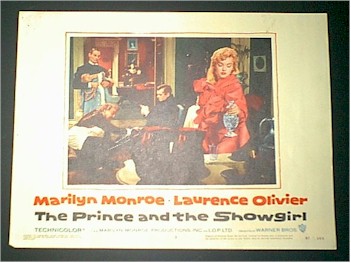
Pictures:
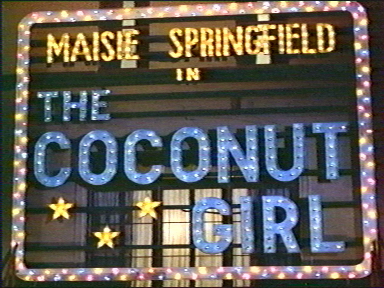
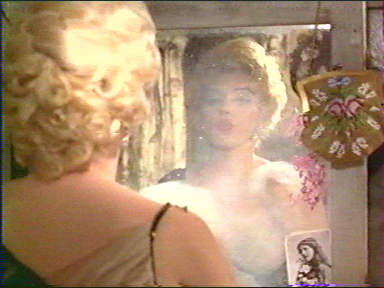
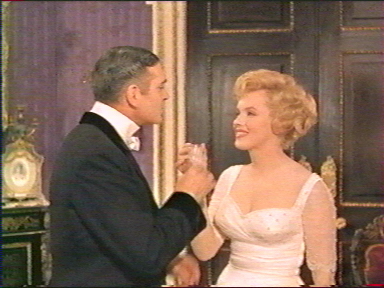
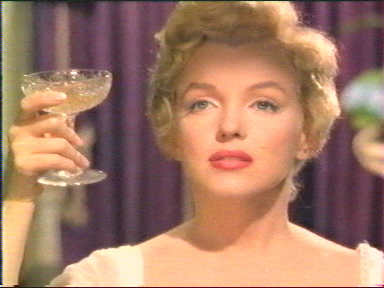
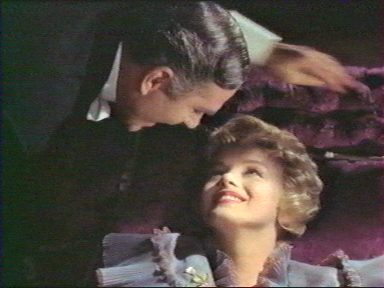
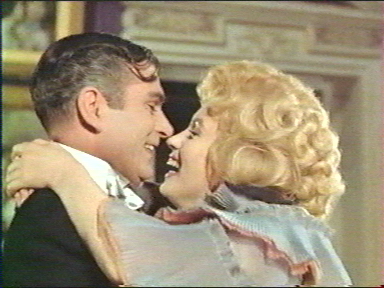
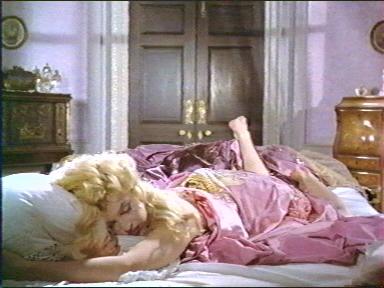
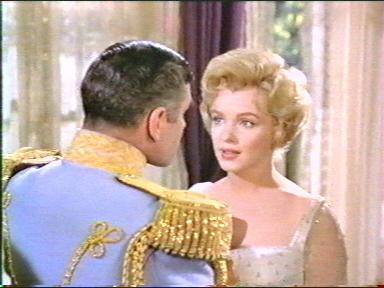
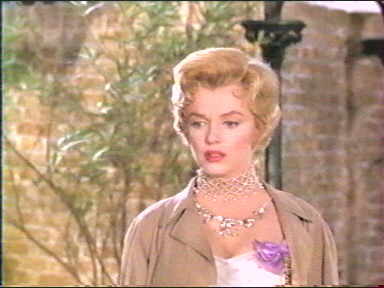
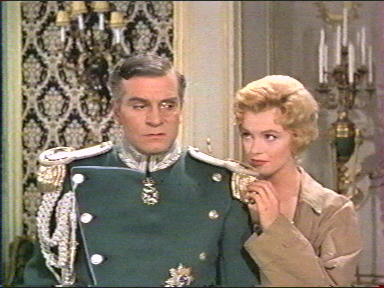
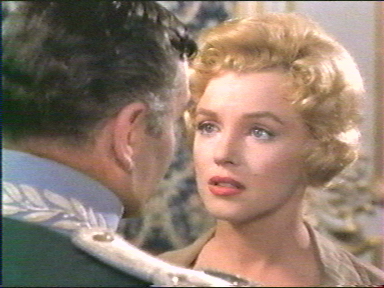
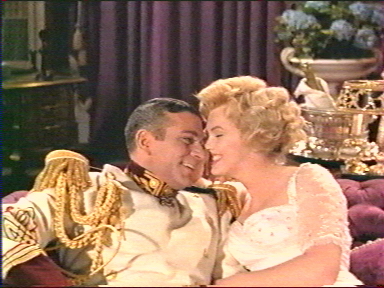
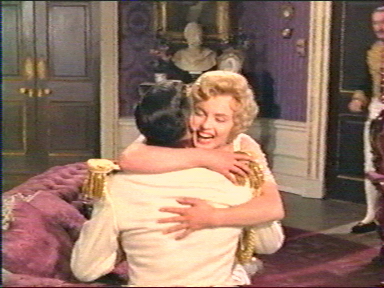
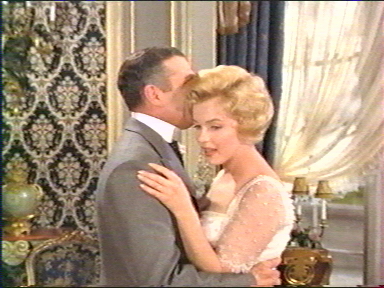
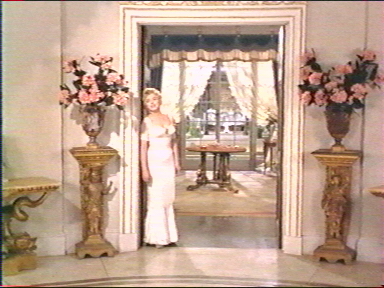
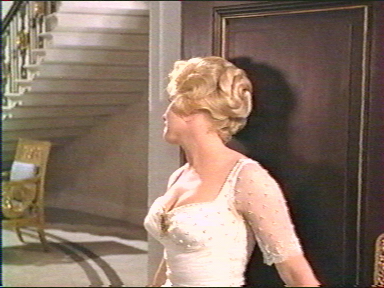
--------------------------------------------------------------------------------------------------------------------------
The Musical
The girl who came to supper
A Musical Comedy in Two Acts, 16 Scenes. Book
by Harry Kurnitz. Based on the play The Sleeping Prince by Terence Rattigan.
Music and lyrics by Noel Coward. - Broadway Theatre, New York - 8 December,
1963 (112 performances)
Synopsis:
ACT I
On the night before the coronation of George
V in 1911, London is in a gala mood. At the Majestic Theatre, the first
act finale of a charming period musical The Coconut Girl ends. At its conclusion,
the Grand Duke Charles - Prince Regent of Carpathia - visits the company,
who honour him by singing the Carpathian National anthem, while his body
guards in patriotic fervour fly into a czardas. The Prince Regent then
explains his colorful ancestral background.
Chorus girl Mary Morgan has caught the Regent's
eye, and Northbrook, assigned by the British government to the Carpathian
retinue during their stay in London, brings Mary an invitation from the
Prince Regent to dine at the Carpathian Embassy after the show. Mary imagines
herself as the toast of the international set, cleverly and wittily dazzling
all the guests. At the Carpathian Embassy, the normal routine is somewhat
upset. The Prince Regent arrives, perturbed by reports of riots in his
homeland. Northbrook enters with Mary, who is nervous about how to behave
in the presence of nobility. Northbrook instructs her to address royalty
as Sir or Ma'am and to obey the rules of protocol. She is suspicious of
the prepared supper for two; however, after Northbrook refers to closer
Anglo-Carpathian relations, the Congress of Vienna and balance of power,
she agrees to stay-for only forty-five minutes.
When the Prince Regent and Mary are alone,
they seem pleased with one another. He plies her with vodka but is soon
interrupted by a series of arrivals: the elderly Queen Mother of Carpathia
comes to plead with her son for greater leniency toward his teenage son,
King Nicolas, who has been conspiring with the rebels at home against his
father's autocratic rule.
Further interruptions include a telephone
call reporting the arrest of Carpathia's opposition leader, a verbatim
recital by Mary of the Bill of Rights, and the arrival of King Nicolas
protesting his arrest. When they are alone at last, the Prince Regent pleads
that he is lonely, but Mary, who has had too much vodka, passes out.
Mingling with the people in St. Martin's Lane,
Nicolas meets Ada Cockle, Cockney extraordinaire, peddler of fish and chips,
lowing lover of life and London, who belts out Cockney ballads.
The next morning, Mary, clad in a bedspread
and under the euphoric misconception that she has given all for love, proclaims
her newborn love for the Prince Regent. Her "darlings" addressed to him
bring only an icy "Miss Morgan" in return, and her rapturous references
to last night are met with the acid comment that he was unfortunately unable
to be present. Mary dresses hurriedly, and, when Nicholas returns, tells
him she is rooting for him against the "mean, stubborn tyrant." She is
only partially flattered by the boy's worldly compliment that he likes
her better than any of his father's other mistresses.
Northbrook's attempts to smuggle Mary out
of the Embassy are intercepted by a fanfare and the Carpathian royal retinue
in full regalia on their way to the coronation. However, when her lady-in-waiting
becomes ill, the Queen Mother appoints Mary to the position for the occasion
and bedecks her in diamonds and sable, while the infuriated Prince Regent
is forced to invest Mary with the Order of Perseverance, given only for
personal service to the head of state.
ACT II
At Westminster Abbey, the assembled nobles
lament their boredom, punctuated by Mary's enthrallment. Mary goes back
to the Embassy to return the jewels but is interrupted by Nicholas, who
prevails upon her to place a conspiratorial phone call for him to the German
ambassador. The call is cut short, however, by the arrival of the Regent,
who has had the wires tapped and places his son under house arrest. Mary
delivers a lecture on fatherly love, then is dismissed by the Regent, who
finds, for the first time, that he has lost the mastery of a situation.
The Prince Regent relents enough to command
Nicolas to attend the Foreign Office Ball and orders him to have a good
time, while the Queen Mother drafts Mary to accompany Nicolas. The Regent
has invited the elegantly beautiful and compliant Lady Sunningdale to supper
after the ball. She has every virtue but virtue itself.
Strolling through the streets after the ball,
Mary entertains Nicolas with the hilariously complex plot of The Coconut
Girl, the touching story of a nut tycoon and his daughter, The Coconut
Girl, who becomes involved variously with two Yale men, an Italian villa,
a garden swing, some gambling casino chorus girls, a coconut blight and
a dance called The Walla Bolla Boola.
Back at the Embassy, Mary confounds the Prince
Regent by reading him a proclamation she has drafted for Nicolas, renouncing
his conspiracy with the Germans to overthrow his father, who insists that
firmness toward his son has brought order to Carpathian chaos. Mary's comforting
sympathy elicits the Prince Regent's happy admission that this is the time
for true love.
In the morning, the Prince Regent, a new man,
makes arrangements for Mary's return with him to Carpathia and decrees
free lections at home. But Mary realises the impossibility of his happy
plans. With tender longing the lovers bid adieu, with the frail hope that
someday - perhaps in Paris - they will be reunited. Weary now of the power
he had clung to so fiercely, the Prince Regent wistfully reflects that
he will remember her and leaves. As all the gilt and grandeur about her
silently recedes, Mary departs, lingering only to pluck one rose, fragrant
with memories.
Taken from original notes by Curtis F Brown
Musical Numbers:
Swing Song - Jessie Maynard, Tony Morelli,
Ensemble
Yasni Kozkolai (Carpathian National Anthem)
- Ensemble
My Family Tree - Charles, Peter, Regent's
Aides
I've Been Invited to a Party - Mary
Waltz - Ensemble
I've Been Invited to a Party (reprise) - Mary
When Foreign Princes Come to Visit Us - Major-Domo,
Footmen
Sir or Ma'am - Peter
Soliloquies - Charles, Mary
Lonely Charles
London Is a Little Bit of All Right - Ada
What Ho, Mrs. Brisket - Ada, Ensmble
Don't Take Our Charlie for the Army - Ada,
Ensemble
Saturday Night at the Rose and Crown - Ada,
King Nicholas, Ensemble
London Is a Little Bit of All Right (reprise)
- Ada
Here and Now - Mary
I've Been Invited to a Party (reprise) - Mary
Soliloquies (reprise) - Charles, Mary
Coronation Chorale - Mary, Charles, Principals,
Ensemble
How Do You Do, Middle Age? - Charles
Here and Now (reprise) - Mary
The Stingaree - Charles, Lady Sunningdale,
Ensemble
Curt, Clear and Concise - Charles, Peter
Tango - Charles, Mary, Dancing Ensemble
The Cocoanut Girl: Welcome to Pootzie Van
Doyle/Paddy MacNeil and His
Automobile/Swing Song/Six Lillies of the Valley/The
Walla Walla Boola - Mary
This Time It's True Love Mary
This Time It's True Love (reprise) - Charles
I'll Remember Her - Charles
Scenes and settings:
The play takes place in London, just prior
to and during the Coronation of His Majesty George V.
Act 1
Scene 1: Backstage at the Majestic Theatre.
- Scene 2: A Dressing Room Backstage. - Scene 3: Backstage. - Scene 4:
The Regent's Apartment, Carpathian Embassy, Belgrave Square. - Scene 5:
St. Martin's Lane. - Scene 6: Trafalgar Square. - Scene 7: St. Martin's
Lane. - Scene 8: The Regent's Apartment. The next morning. - Scene 9: The
Great Hall of the Embassy.
Act 2
Scene 1: Westminster Abbey. - Scene 2: The
Regent's Apartment. - Scene 3: A Drawing Room, Carpathian Embassy. - Scene
4: The Foreign Office Ball. - Scene 5: St. Martin's Lane. - Scene
6: The Regent's Apartment, after the Ball. - Scene 7: The Regent's - Apartment.
The next morning.
Cast (in order of appearance):
Jessie Maynard - Mary Morgan - Tony Morelli
- Mr. Grimes - Violetta Vines - Peter Northbrook - Colonel Hofmann - Grand
Duke Charles, Prince Regent of Carpathia - First Girl - Second Girl - Major-Domo
- King Nicholas III of Carpathia - Simka - Queen Mother - Ada Cockle -
Baroness Brunheim - Lady Sunningdale - Chorus
Original Broadway cast:
Jose Ferrer, Florence Henderson, Irene Browne,
Tessie O'Shea, Roderick Cook, Sean Scully, Carey Nairnes md Jay Blackton.
Picture:
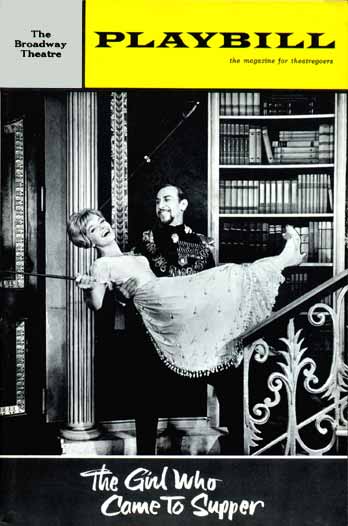
Copyrights and all rights are reserved to the owner of the rights.
Site owner: Gilles Ollevier
Heroes of Mariah 2000
E-mail: staff@heroesofmariah.com
Index